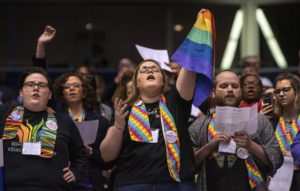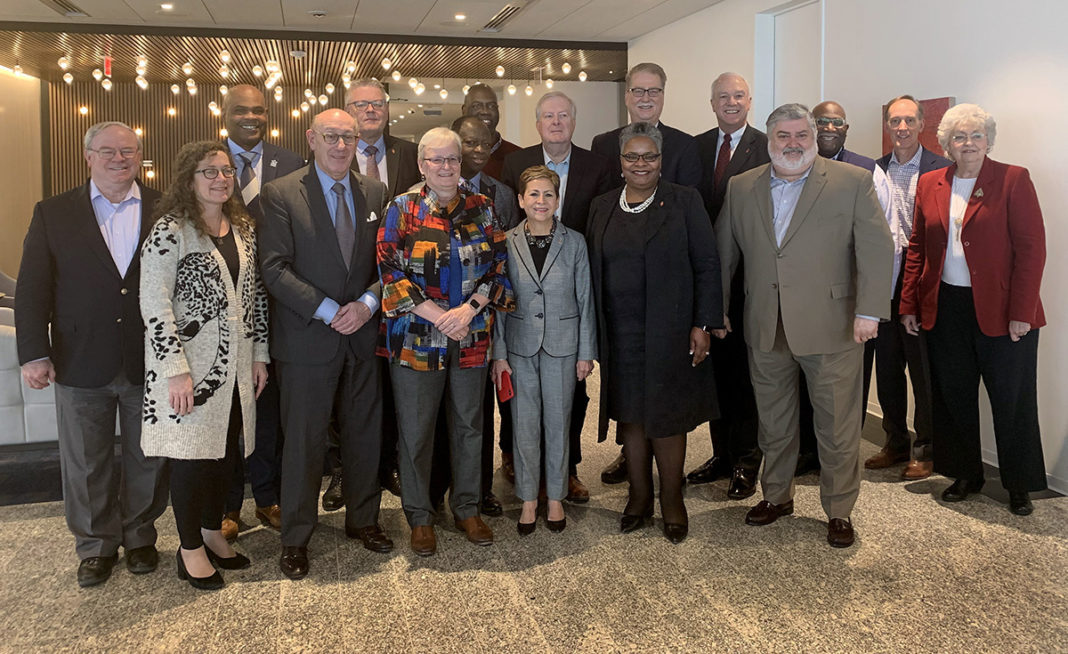At the 2019 United Methodist Church (UMC) General Conference, delegates met to discuss opposing views and to confirm the denomination’s church discipline with regards to same-sex marriage and the ordination of LGBTQ clergy.

Today, a proposal by a diverse group of representatives from United Methodist advocacy groups with contrasting views and bishops from around the world, entitled “PROTOCOL OF RECONCILIATION & GRACE THROUGH SEPARATION” declares that the United Methodist Church and its members “did not resolve their differences specifically related to the full participation of LGBTQ persons in the life of the Church” and that the denomination is now at an impasse.
According to a statement being released by the Council of Bishops Office on behalf of the Mediation Team members,
“The Protocol anticipates the formation of a new traditionalist Methodist denomination. Once formed, the new church would receive $25 million over the next four years and give up further claim to the UMC’s assets. An additional $2 million would be allocated for potential additional new Methodist denominations which may emerge from the UMC.
Acknowledging the historical role of the Methodist movement in systematic racial violence, exploitation and discrimination, the Protocol would allocate $39 million to ensure there is no disruption in supporting ministries for communities historically marginalized by racism.”
The Protocol was unanimously supported and signed by the parties, with mediation efforts led by prominent attorney, Kenneth Feinberg, who served as Special Master of the September 11th Victim Compensation Fund and administrator of the BP Deepwater Horizon Disaster Victim Compensation Fund.
In May, a final, church-wide vote will be held on the Protocol at the 2020 United Methodist Church General Conference in Minneapolis, MN.
The signatories to the Protocol have provided a FAQ document to provide additional information about the agreement. Comments and questions may be directed to the signatories at mediationprotocol@outlook.com.
A live stream event will take place on Monday, January 13, to provide further clarity and explanations of the plan by members of the Mediation Team.
Members of the Mediation Team
- Bishop Christian Alsted (bishop@umc-ne.org), Nordic-Baltic Episcopal Area
- Rev. Thomas Berlin (tberlin@florisumc.org), representing UMCNext, Mainstream UMC, Uniting Methodists
- Bishop Thomas J. Bickerton (bishop@nyac.com), New York Episcopal Area
- Rev. Keith Boyette (president@wesleyancovenant.org), representing The Confessing Movement, Good News, IRD/UM Action, and the Wesleyan Covenant Association
- Bishop Kenneth H. Carter (bishop@flumc.org), Florida Episcopal Area
- Rev. Junius Dotson (jdotson@umcdiscipleship.org), representing UMCNext, Mainstream UMC, United Methodists
- Bishop LaTrelle Easterling (bishopeasterling@gmail.com), Washington Episcopal Area
- Rev. Egmedio “Jun” Equila, Jr. (jun@brmc.org.sg), Philippines Central Conference
- Bishop Cynthia Fierro Harvey (bishop@la-umc.org), Louisiana Episcopal Area
- Bishop Rodolfo Rudy Juan (bishoprudyjuan@gmail.com), Davao Episcopal Area, Philippines
- Janet Lawrence (jan@rmnetwork.org), representing Affirmation, Methodist Federation for Social Action, and Reconciling Ministries Network
- Rev. David Meredith (dmeredith@cliftonumc.com), representing Affirmation, Methodist Federation for Social Action, and Reconciling Ministries Network, member of UM Queer Clergy Caucus
- Patricia Miller (pmiller1224@gmail.com), representing The Confessing Movement, Good News, IRD/UM Action, and the Wesleyan Covenant Association
- Dr. Randall Miller (randall4015@hotmail.com), representing Affirmation, Methodist Federation for Social Action, and Reconciling Ministries Network
- Bishop Gregory Vaughn Palmer (wocbishop@woc.org), Ohio West Episcopal Area
- Bishop John K. Yambasu (bishopyambasu@gmail.com), Sierra Leone Episcopal Area




